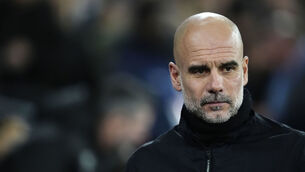Trap and the Pressing game
After all, it was just more of the same from Irish football’s foremost hurler of abuse on the ditch, a man who seems incapable of mounting a perfectly reasonable argument — that Ireland’s brand of football is often far from uplifting under Giovanni Trapattoni — without expressing it in the shrill, self-righteous tones of an insufferable pub bore.
But, considering all the gaiety he brings to the nation, we wouldn’t really have it any other way. And especially not in a slow week ahead of a dead rubber game, when Dunphy’s latest descent into self-caricature was the straw which broke the camel’s back as far as Stephen Hunt was concerned.












